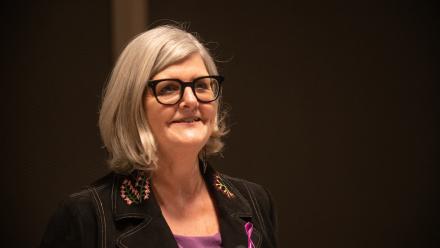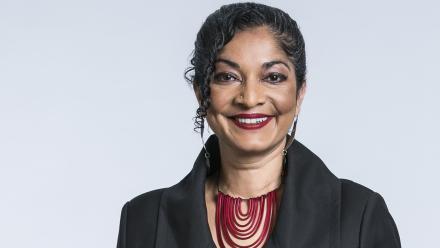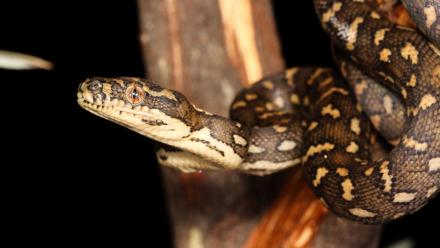A treasure of legacies
Alopi Latukefu (BA '93, GDipDevAdmin '95, MPubPol '07)
01 Dec 2022
Following nearly 17 years working on Australia's development, economic, foreign and public diplomacy engagement I am taking on a new role as Director for the Edmund Rice Centre in February 2023. Even now, when I reflect on my time at ANU, I am grateful for the amazing legacies I was able to draw on from my network of academics and colleagues - particularly Pacific focused scholars - who were friends and colleagues of my parents.
Growing up, I was a child of many different cultures. My mother and her parents were Jewish refugees from Germany, my father was Tongan, and I grew up in Papua New Guinea. But at the time - in the late eighties and early nineties - the idea of diversity wasn't as well developed as it is today. Part of the journey at The Australian National University (ANU) was really gaining the confidence in who I am as an individual and bringing all of that to bear in everything I do. During this formative time, I built on my confidence as someone of mixed heritage to not feel the need to fit a particular mould or conform to the majority perspective - but to value the diversity I represented and what it could bring to my future career. I have certainly used this in the many roles I've held over my career, and as an advocate with the Cultural and Linguistic Diversity Network in the Department of Foreign Affairs and Trade.
I've always maintained the connections I made at ANU and have drawn on them throughout my career. This has been a way for me to access the great minds, knowledge and experience the University. Whenever opportunities arise to draw on my ANU networks, I do so.
I chose to study at ANU not only because it was a prestigious university but also because my father, Reverend Dr Sione Latukefu, had completed his PhD there in the 1960s. My father was keen for me to not only study at ANU but also to stay at Bruce Hall, where he was a resident during his postgraduate studies. It so happened that at the same time I joined ANU my father was asked to be a non-resident fellow of his old college residence by his friend, colleague and fellow 'Bruce Haller' - Professor Noel Rutherford.
As an institution, ANU covered a lot of areas of interest for me, particularly its focus on the Pacific and on disciplines that tried to understand the challenges and opportunities facing the region. ANU had more teaching programs, graduate schools and people with expertise in Pacific studies than most other institutions in Australia and in some contexts globally - something it had built a niche in since its establishment as act of the Commonwealth Parliament in 1946.
My father was an inspiration for me to study in this area. He was a Pacific historian from Tonga whose best known work was a book 'Church and State in Tonga' based on his PhD thesis originally published by ANU press in 1974. It became the first major history of Tonga and to an extent the region written by a Pacific Islander. My father's supervisor, Professor Jim Davidson, was keenly focused on emergent voices from the region telling their perspectives and versions of history. Until this time most histories had been collated from European missionary or military records. So my father's account was an indigenous voice from the region with a much deeper, longer and broader understanding of the Pacific drawn not just from the documentation of the colonising and religious institutions in the region - but importantly the rich vein or oral traditions dating back many hundreds and even thousands of years. Although my dad was brought out by the church to do his undergraduate and was supported to do his postgraduate degree, he became an important contributor to the idea that the Pacific didn't start with Cook and discovery by European powers, but in fact had its histories and roots bound to millennia of human settlement in the Indo Pacific and Asia Pacific.
During my time at ANU, I built friendships and relationships, particularly with Bruce Hall people. The lovely thing about residential colleges is that you meet such a diverse group of people. You're all studying very different things, but you have that common experience as a young person forming relationships and experiences with others at a critical time in your life. I still count many of those connections I made at ANU over 30 years ago as some of my closest friends, despite often having very different professional pursuits. I know that my dad had the same experience and was part of the reason why he wanted me to go to Bruce Hall. It was such an amazing place to experience at the time and I hope is something still in the spirt of the residential colleges erected in their place.
As mentioned earlier Dr Noel Rutherford, a fellow historian and specialist in Tongan History, was appointed Warden of Bruce Hall following the long tenured Bill Packard. Noel, one day approached and asked me to do a Pacific night for all of the residents to showcase Pacific culture and traditions. So, I gathered up all the students I could muster including my father and extended family, to help me dig up the quadrangle to create an umu - a traditional earth oven - in preparation for a traditional feast as part of the event. At the same time, I taught a number of the Pacific and non-Pacific Island students some traditional songs and dances that I'd learned growing up in Papua New Guinea for them to perform as part of the event. We hosted a kava ceremony to provide a sense of the protocols and traditions of the region. A number of fellow Pacific students from Fiji and Tonga got involved to showcase their own songs and dances. Until that point, many of the local students had only been exposed to Pacific people through holidays, sport, singing or the church, so for them it was a wonderful opportunity to broaden their understanding of Pacific people and culture. An added bonus was that as a result of us digging up the quadrangle, we rediscovered the watering system that hadn't been used for 30 years and from that point on the quadrangle looked a lot greener!
My message to current students is to be as open to knowledge as you can be. A lot of students commence university with a particular idea of what they want to be and where they want to go. My view is that you should let yourself be moulded by the university experience, what your interests are from your time at ANU. The most interesting work is often what you find you have a passion for.
Other stories you might like to read
Page Owner:
Alumni


